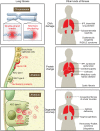Insights from human genetic studies of lung and organ fibrosis
- PMID: 29293091
- PMCID: PMC5749497
- DOI: 10.1172/JCI93556
Insights from human genetic studies of lung and organ fibrosis
Abstract
Genetic investigations of fibrotic diseases, including those of late onset, often yield unanticipated insights into disease pathogenesis. This Review focuses on pathways underlying lung fibrosis that are generalizable to other organs. Herein, we discuss genetic variants subdivided into those that shorten telomeres, activate the DNA damage response, change resident protein expression or function, or affect organelle activity. Genetic studies provide a window into the downstream cascade of maladaptive responses and pathways that lead to tissue fibrosis. In addition, these studies reveal interactions between genetic variants, environmental factors, and age that influence the phenotypic spectrum of disease. The discovery of forces counterbalancing inherited risk alleles identifies potential therapeutic targets, thus providing hope for future prevention or reversal of fibrosis.
Conflict of interest statement
Figures



References
Publication types
MeSH terms
Grants and funding
LinkOut - more resources
Full Text Sources
Other Literature Sources
Medical

